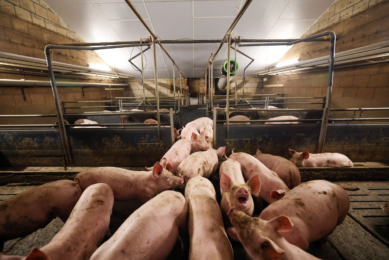Pigs eat bread to help human health

Pigs are being fed bread at Aarhus University, Denmark, to serve as models for humans in the development of healthy foods.
Together with rats and humans, the pigs serve in trials to shed more light on the effect of low-fibre and high-calorie foods on the human health. Key to these trials is to find out whether new, healthy foods that do not compromise people’s liking for modern food can be developed.
The typical Western diet with lots of fat, sugar and starch but low in fibre may lead to problems with overweight, obesity and type II diabetes. Hence, scientists try to investigate if they can change the carbohydrate composition of foods to make them healthier.
Refined carbohydrates
One of the problems with the modern, Western diet is that it consists of refined carbohydrates. In practice this means that you are quickly satiated, but also quickly become hungry again and hence will be tempted to eat more.
"By adding modified carbohydrates to the food we hope to be able to reduce the rate by which glucose is absorbed from the gut and improve the regulation of the blood sugar level," says research professor and leader of the project Knud Erik Bach Knudsen from the Department of Animal Health and Bioscience at the Faculty of Agricultural Sciences, Aarhus University.
Gastrointestinal tract
The project aims to investigate different types of carbohydrates in relation to type II diabetes. The scientists will study how some types of carbohydrate can affect the rate of glucose absorption from the gastrointestinal tract by feeding pigs and humans different types of fibre and starch. One of the substances that scientists intend to test is beta-glucan.
The different types of carbohydrate can, in principle, be added to many different kinds of food besides bread, for example breakfast products. The experiment will use white bread with added beta-glucan, arabinoxylans and modified starches.
Absorption rate
"We will investigate how the absorption rate can be affected, mechanisms by which it takes place, and how diet affects the body in the short and long term. By the end of the day, we hope to be able to create new healthy food ingredients, Knud Erik Bach Knudsen explains.
The four-year project is carried out in collaboration with Aarhus University Hospital, the Faculty of Life Sciences at University of Copenhagen, and the three industrial enterprises Novozymes, Biovelop and Lantmännen food R&D. The project is supported by a grant from the Danish Agency for Science, Technology and Innovation and Nordforsk.
Related websites:
Lantmännen
Aarhus University











